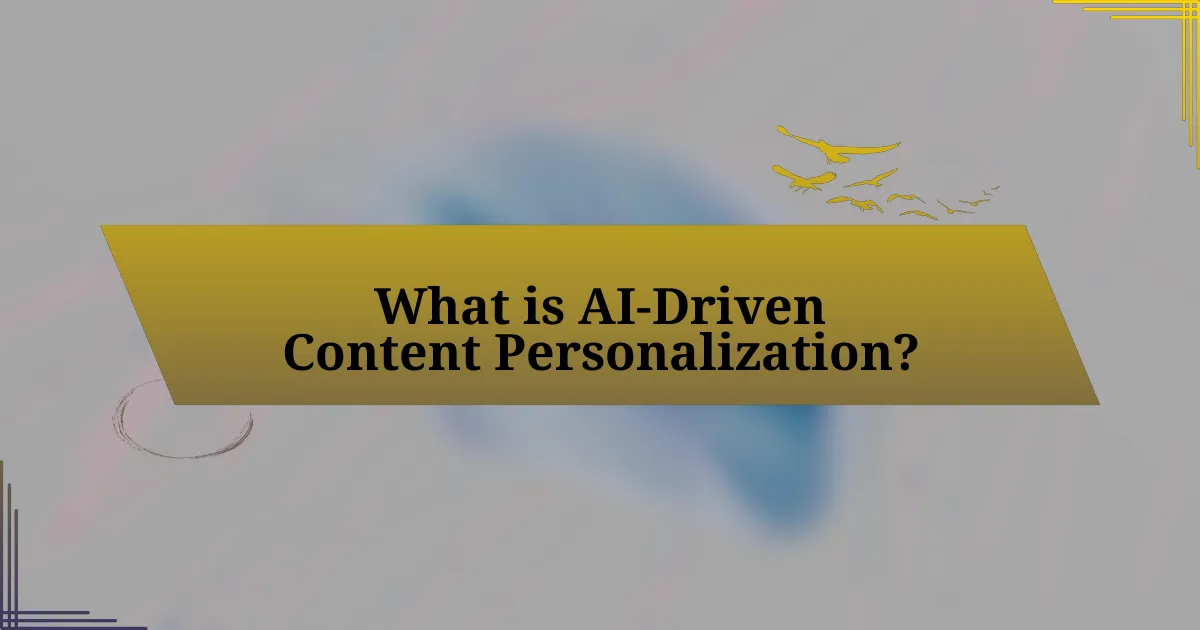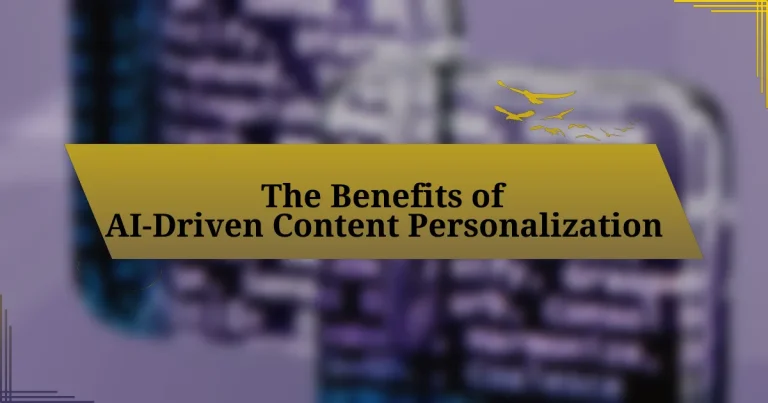AI-Driven Content Personalization utilizes artificial intelligence technologies to customize content based on individual user preferences and behaviors, significantly enhancing user engagement and satisfaction. The article explores how this personalization works through algorithms and data analytics, the technologies involved, and the importance of data collection. It highlights the benefits, including increased conversion rates and customer loyalty, while also addressing challenges such as data privacy and algorithmic bias. Additionally, it outlines best practices for effective implementation and the long-term financial advantages of adopting AI-driven personalization strategies.

What is AI-Driven Content Personalization?
AI-Driven Content Personalization refers to the use of artificial intelligence technologies to tailor content to individual user preferences and behaviors. This approach leverages algorithms and data analytics to analyze user interactions, enabling the delivery of customized experiences that enhance engagement and satisfaction. For instance, a study by McKinsey & Company found that companies utilizing AI for personalization can achieve a 10-15% increase in revenue by effectively targeting content to specific audience segments.
How does AI-Driven Content Personalization work?
AI-driven content personalization works by utilizing algorithms and machine learning techniques to analyze user data and behavior, tailoring content to individual preferences. This process involves collecting data from various sources, such as browsing history, demographic information, and engagement metrics, which are then processed to identify patterns and trends. For instance, a study by McKinsey & Company found that companies using AI for personalization can increase their revenue by 10% to 30% by delivering more relevant content to users. By continuously learning from user interactions, AI systems refine their recommendations, ensuring that the content remains aligned with evolving user interests and needs.
What technologies are involved in AI-Driven Content Personalization?
AI-Driven Content Personalization involves several key technologies, including machine learning algorithms, natural language processing, data analytics, and recommendation systems. Machine learning algorithms analyze user behavior and preferences to tailor content effectively. Natural language processing enables the understanding and generation of human language, allowing for more personalized interactions. Data analytics processes large datasets to identify trends and insights that inform content strategies. Recommendation systems utilize collaborative filtering and content-based filtering to suggest relevant content to users based on their past interactions and preferences. These technologies collectively enhance user engagement and satisfaction by delivering customized content experiences.
How does data collection enhance AI-Driven Content Personalization?
Data collection enhances AI-driven content personalization by providing the necessary insights into user preferences and behaviors. This information allows AI algorithms to analyze patterns and tailor content to individual users, improving engagement and satisfaction. For instance, a study by McKinsey & Company found that companies leveraging personalized experiences can see a 10-30% increase in revenue. By continuously gathering data, AI systems refine their understanding of user needs, leading to more relevant content recommendations and a better overall user experience.
Why is AI-Driven Content Personalization important?
AI-Driven Content Personalization is important because it enhances user engagement and satisfaction by delivering tailored experiences. Personalized content increases the likelihood of user interaction, as studies show that 80% of consumers are more likely to make a purchase when brands offer personalized experiences. Furthermore, AI algorithms analyze user behavior and preferences, allowing businesses to optimize their content strategies effectively, leading to higher conversion rates and customer loyalty.
What impact does AI-Driven Content Personalization have on user engagement?
AI-Driven Content Personalization significantly enhances user engagement by delivering tailored experiences that resonate with individual preferences. This personalization leads to increased interaction rates, as users are more likely to engage with content that aligns with their interests and behaviors. Research indicates that personalized content can boost engagement metrics by up to 74%, as users find relevant information more compelling and are more inclined to spend time on platforms that cater to their specific needs.
How does AI-Driven Content Personalization improve customer satisfaction?
AI-Driven Content Personalization improves customer satisfaction by delivering tailored experiences that meet individual preferences and needs. This personalization enhances engagement, as customers are more likely to interact with content that resonates with their interests. Research indicates that 80% of consumers are more likely to make a purchase when brands offer personalized experiences, demonstrating a direct correlation between personalization and customer satisfaction. Furthermore, AI algorithms analyze user behavior and feedback in real-time, allowing businesses to continuously refine content offerings, thereby increasing relevance and satisfaction over time.

What are the key benefits of AI-Driven Content Personalization?
AI-Driven Content Personalization enhances user engagement and satisfaction by delivering tailored content based on individual preferences and behaviors. This approach increases conversion rates, as personalized experiences can lead to a 20% increase in sales, according to a study by McKinsey & Company. Additionally, AI algorithms analyze vast amounts of data to predict user needs, resulting in more relevant content recommendations that improve retention rates. Furthermore, businesses benefit from improved customer insights, allowing for more effective marketing strategies and resource allocation.
How does AI-Driven Content Personalization increase conversion rates?
AI-Driven Content Personalization increases conversion rates by delivering tailored content that resonates with individual user preferences and behaviors. This targeted approach enhances user engagement, as personalized recommendations can lead to a 10% to 30% increase in conversion rates, according to a study by McKinsey & Company. By analyzing user data, AI systems can predict what content will be most appealing to each user, thereby improving the likelihood of a purchase or desired action.
What role does targeted content play in driving conversions?
Targeted content significantly enhances conversion rates by delivering personalized messages that resonate with specific audience segments. This personalization increases engagement, as consumers are more likely to respond positively to content that addresses their unique needs and preferences. According to a study by Epsilon, 80% of consumers are more likely to make a purchase when brands offer personalized experiences. By utilizing data analytics and AI-driven insights, businesses can create targeted content that aligns with customer behavior, leading to higher conversion rates and improved customer satisfaction.
How can businesses measure the success of AI-Driven Content Personalization?
Businesses can measure the success of AI-Driven Content Personalization through key performance indicators (KPIs) such as engagement rates, conversion rates, and customer satisfaction scores. Engagement rates can be tracked by analyzing metrics like click-through rates and time spent on personalized content, which indicate how well the content resonates with users. Conversion rates reflect the effectiveness of personalized content in driving desired actions, such as purchases or sign-ups, providing a direct measure of ROI. Customer satisfaction scores, often gathered through surveys, can reveal how personalized experiences impact overall customer perceptions and loyalty. According to a study by McKinsey, companies that excel in personalization can achieve a 10-30% increase in revenue, underscoring the importance of these metrics in evaluating success.
What cost savings can be achieved through AI-Driven Content Personalization?
AI-Driven Content Personalization can achieve significant cost savings by optimizing marketing expenditures and enhancing customer engagement. By utilizing algorithms to analyze user data, businesses can tailor content to specific audience segments, leading to higher conversion rates and reduced customer acquisition costs. For instance, a study by McKinsey found that personalized marketing can increase sales by 10% or more, demonstrating a direct correlation between personalization and revenue growth. Additionally, AI can automate content creation and distribution processes, reducing labor costs and time spent on manual tasks. This efficiency not only lowers operational expenses but also allows companies to allocate resources more effectively, maximizing return on investment.
How does automation reduce operational costs?
Automation reduces operational costs by streamlining processes and minimizing human error. By implementing automated systems, organizations can enhance efficiency, reduce labor costs, and improve accuracy in tasks such as data entry, inventory management, and customer service. For instance, a study by McKinsey & Company found that automation can increase productivity by up to 30%, leading to significant cost savings. Additionally, automation allows for 24/7 operations without the need for breaks or overtime pay, further contributing to reduced expenses.
What are the long-term financial benefits of implementing AI-Driven Content Personalization?
Implementing AI-Driven Content Personalization leads to significant long-term financial benefits, including increased customer retention and higher conversion rates. Businesses that utilize personalized content can see a revenue increase of up to 20%, as personalized experiences enhance customer engagement and satisfaction. For instance, a study by McKinsey & Company found that companies that excel in personalization can achieve 5 to 8 times the ROI on their marketing spend. Additionally, AI-driven personalization reduces customer acquisition costs by fostering loyalty and repeat purchases, ultimately resulting in a more sustainable revenue stream over time.

What challenges are associated with AI-Driven Content Personalization?
AI-Driven Content Personalization faces several challenges, including data privacy concerns, algorithmic bias, and the complexity of user preferences. Data privacy concerns arise from the need to collect and analyze personal information, which can lead to potential breaches and user distrust. Algorithmic bias can result in skewed content recommendations, as AI systems may inadvertently favor certain demographics or viewpoints, limiting diversity in content exposure. Additionally, understanding and accurately predicting the complex and evolving preferences of users is difficult, making it challenging to deliver truly personalized experiences. These challenges highlight the need for careful implementation and ongoing evaluation of AI-driven personalization strategies.
What ethical considerations should be taken into account?
Ethical considerations in AI-driven content personalization include data privacy, consent, algorithmic bias, and transparency. Data privacy is crucial as personal information must be protected to prevent misuse; for instance, the General Data Protection Regulation (GDPR) mandates strict guidelines on data handling. Consent is necessary to ensure users are aware of and agree to how their data is used. Algorithmic bias can lead to unfair treatment of certain groups, which necessitates regular audits of AI systems to identify and mitigate bias. Transparency is essential for building trust, as users should understand how personalization algorithms work and how their data influences content delivery. These considerations are vital to ensure ethical practices in the deployment of AI technologies.
How can businesses ensure data privacy while personalizing content?
Businesses can ensure data privacy while personalizing content by implementing robust data protection measures, such as encryption, anonymization, and obtaining explicit user consent. These strategies help safeguard personal information and comply with regulations like GDPR, which mandates that organizations must protect user data and provide transparency about its use. For instance, a study by the International Association of Privacy Professionals found that companies prioritizing data privacy not only enhance customer trust but also improve their overall brand reputation.
What are the potential biases in AI algorithms for content personalization?
AI algorithms for content personalization can exhibit several potential biases, including data bias, algorithmic bias, and user bias. Data bias occurs when the training data reflects societal prejudices or lacks diversity, leading to skewed recommendations that favor certain demographics over others. Algorithmic bias arises from the design and implementation of the algorithms themselves, which may prioritize specific features or patterns that do not represent the broader user base. User bias is introduced when individual user interactions reinforce existing preferences, creating echo chambers that limit exposure to diverse content. These biases can result in unfair treatment of certain groups and a lack of varied content, ultimately undermining the effectiveness of personalization efforts.
How can businesses overcome the challenges of AI-Driven Content Personalization?
Businesses can overcome the challenges of AI-driven content personalization by implementing robust data management strategies and investing in advanced machine learning algorithms. Effective data management ensures that businesses collect, store, and analyze customer data accurately, which is crucial for creating personalized experiences. For instance, a study by McKinsey found that companies that leverage customer data effectively can increase their marketing ROI by 15-20%. Additionally, investing in machine learning algorithms allows businesses to better understand customer preferences and behaviors, enabling them to deliver relevant content at the right time. Research from Gartner indicates that organizations using AI for personalization can see a 10-30% increase in customer engagement. By focusing on these strategies, businesses can effectively navigate the complexities of AI-driven content personalization.
What best practices should be followed for effective implementation?
Effective implementation of AI-driven content personalization requires a structured approach that includes data collection, algorithm selection, continuous testing, and user feedback integration. First, organizations should gather comprehensive user data to understand preferences and behaviors, which is essential for tailoring content effectively. Next, selecting the appropriate algorithms, such as collaborative filtering or natural language processing, ensures that the personalization is relevant and engaging. Continuous testing, including A/B testing, allows for the optimization of content delivery based on real-time user interactions. Finally, integrating user feedback into the system helps refine the personalization process, ensuring it evolves with changing user needs. These practices are supported by studies indicating that personalized content can increase engagement rates by up to 74%, demonstrating the effectiveness of these strategies in achieving successful implementation.
How can continuous learning improve AI-Driven Content Personalization strategies?
Continuous learning enhances AI-driven content personalization strategies by enabling systems to adapt and refine their algorithms based on new data and user interactions. This adaptability allows AI models to better understand user preferences, leading to more relevant content recommendations. For instance, a study by Google Research found that machine learning models that incorporate continuous learning can improve user engagement metrics by up to 30% over static models, demonstrating the effectiveness of ongoing data integration and model updates in personalizing content.
What are practical tips for leveraging AI-Driven Content Personalization effectively?
To leverage AI-Driven Content Personalization effectively, businesses should focus on collecting and analyzing user data to tailor content to individual preferences. By utilizing advanced analytics tools, organizations can gain insights into user behavior, enabling them to create personalized experiences that resonate with their audience. For instance, a study by McKinsey & Company found that companies using personalization strategies can increase their revenue by 10% to 30%. Additionally, implementing machine learning algorithms can help in predicting user needs and preferences, further enhancing the personalization process. Regularly updating content based on real-time data ensures that the personalization remains relevant and engaging for users.

